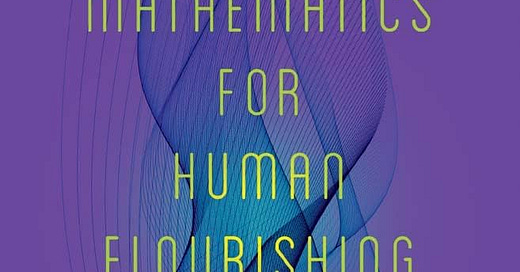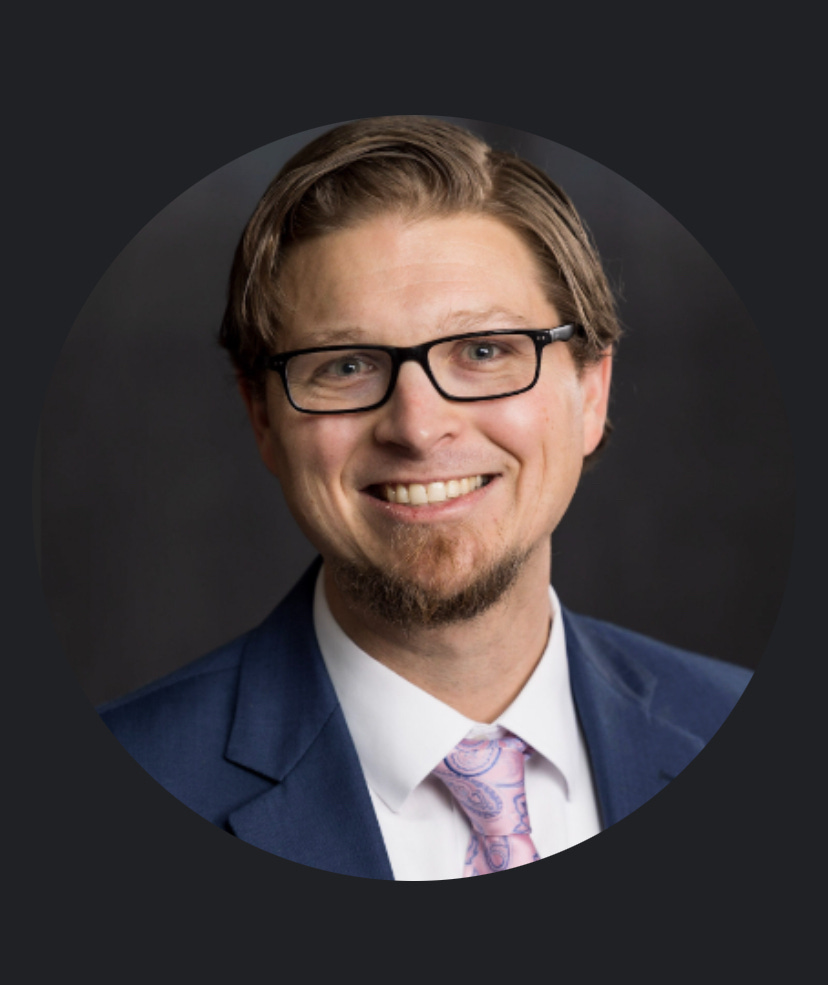As an Amazon Associate I earn from qualifying purchases
Su, Francis. Mathematics for Human Flourishing. Yale University Press, 2020.
Mathematics for Human Flourishing by Francis Su was one of the most remarkable books I have ever read, and I am not someone who was born or raised to love mathematics.
For my first teaching assignment at a dropout recovery High School in inner-city Dallas, I was assigned to be a Special Education teacher. At this district, there were four Special Education teachers assigned to one of the “main 4” content areas - Mathematics, Social Studies (History), ELA (English Language Arts), or Science. As a Philosophy/Biblical Studies major who had recently graduated, I was asked “Do you teach Math?” Somewhat taken aback, I kindly but very directly explained, “I only took one Math class for my major. I would feel more comfortable teaching History or English.” A very short, life-altering response was given: “Now you teach Math.”
From there, I began my career as a educator as a Special Education teacher in courses that I didn’t pay much attention to when I was in high school (Algebra II and Geometry), and one I completed in 8th grade (Algebra I). I had never really thought about mathematics up until this point. Math was something that I did, that I completed, and then that I tried to forget (though I still sing the quadratic formula to the tune of “monkey chased the weasel” to this day).
During my first few years teaching I never thought about math in relation to human flourishing. I taught Math from a utilitarian, practical perspective (“learn this to get a good job, students”). I focused on demonstrating the testing patterns of the state education agency, like the fact that it makes all tests the same by doing longitudinal comparisons of previous state tests such that the same questions repeat themselves year over year.
As for my students, in many ways their life stories mirrored that of Christopher Jackson, whose reflections stand alongside Francis Su’s authorial voice in this important book. Jackson had been “in trouble with the law since he was fourteen. He didn’t finish high school, he had an addiction to hard drugs, and at age nineteen he was involved in a string of armed robberies that landed him in prison with a thirty-two-year sentence.” I found one of the most impactful questions that I have ever read on the second page of Mathematics for Human Flourishing: “When you think about who does Mathematics, would you think of Christopher?”
Su then begins to lay out one of the most beautiful and evangelistic display of a love for math and how it relates to human flourishing that I have ever encountered.
As he writes: “Human flourishing refers to a wholeness — of being and doing, of realizing one’s potential and helping others do the same, of acting with honor and treating others with dignity, of living with integrity even in challenging circumstances. It is not the same as happiness, and it is not just a state of mind. The well-lived life is a life of human flourishing.”
This is a calling for all of humanity to pursue Mathematics for Mathematics’ sake, and there is no such thing as a “Math Person” or an “English Person”. We are all Math People - all teachers of math in one way or another. How can every person be a math teacher?
“You may be a parent someday, or an aunt or uncle, a youth group leader, a community volunteer, or in another position where you influence others - if so, you will be a teacher of math. If you help kids with their homework, you are a teacher of math. If you are afraid to help kids with their homework, you are teaching an attitude about math. Studies show that parents with math anxiety pass on that anxiety to their children.1 In fact, math-anxious parents are more likely to pass on math anxiety if they try to help their kids with their math homework than if they don’t. So your disposition toward math matters as much for a child’s sake as for your own.”
Even those of us who choose to tap into the power of mathematics must be mindful. As Su warns:
“So you and I have a responsibility, as we grow in power, to use it for good — to grow in creative power and not coercive power. Creative power isn’t solely instrumental. You don’t grow in creative power only to accomplish things. You do it to be a better human being, to grow in virtue, to elevate human dignity — your own and those around you — in all mathematical spaces.”
As Dr. Su wrote: “Believe that you and every person in your life can flourish in mathematics.”
So when you think about who does mathematics, would you think of students in a dropout recovery school in inner-city Dallas? Would you think of students who grow up in crime-riddled neighborhoods that don’t have classical school to attend? When you think about who does mathematics–both who is capable of doing mathematics and who wants to do mathematics–would you think of Christopher Jackson?
And yet Christopher Jackson wrote Francis Su a letter after 7 years in prison. He said the following:
“I’ve always had a proclivity for mathematics, but being in a very early stage of youth and also living in some adverse circumstances, I never came to understand the true meaning and benefit of pursuing an education . . . over the last 3 years I have purchased and studied a multitude of books to give me a profound and concrete understanding of Algebra I, Algebra II, College Algebra, Geometry, Trigonometry, Calculus I and Calculus II.”
Christopher had been writing letters to Francis Su for help in furthering his mathematics education for years. Not only is Su’s book a remarkable defense of the beauty of Mathematics, it also presents this phenomenal charge for all of us as fellow human beings from the epilogue taken from an interview that Su had with Jackson after finishing the book. Jackson eloquently states,
“Mathematics has helped me better fortify my patience: sometimes when I’m dealing with some frustrating situation, I remind myself I must have infinite patience. I’ve experience hope that a solution will come to a problem also. I’ve had the experience of: right now, I just can’t see the solution, but if I walk away and come back, I might see the solution, or the next day, or next day, but if I keep it on my mind, I’m going to get it. Nine times out of ten this has worked so far. And also, I understand the community: none of us can be great if we’re not willing to teach other.”
The question that keeps coming back to me is “When you think about who does mathematics, would you think of Christopher? And also, are you willing to be teach and to be taught?
Scott Carpenter is the Founding Head of Schools for Fayette Classical Academy (a Hillsdale College member candidate school), part of the Liberty Classical Schools network in Atlanta, Georgia. He received his undergraduate degree from Dallas Baptist University and his Master's Degree in Educational Leadership from the University of North Texas. He has served at public, private, and charter schools over the course of his professional career, and was as a Teach For America Corps Member before it appeared on The Office.
Erin A. Maloney, Gerardo Ramirez, Elizabeth A. Gunderson, Susan C. Levine, and Sian L. Beilock, “Intergenerational Effects of Parents’ Math Anxiety on Children’s Math Achievement and Anxiety,” Psychological Science 26, no. 9 (2015): 1480-88.



